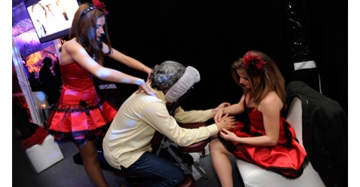 We often find ourselves asking “why would you not employ a specialist to do a specialist’s job?”.
We often find ourselves asking “why would you not employ a specialist to do a specialist’s job?”.
With more brands looking to incorporate experiential marketing in to their communications mix, why are they leaving the responsibility with PR or digital agencies? Do they really have the deep level of understanding to get experiential marketing right, what are the implications of getting it wrong, and are clients maximising their marketing spend?
The role of the middlemen in experiential marketing
Thinking you can do experiential and actually being able to do it are two very different things.
We get a lot of calls from PR agencies who are looking to include an element of what they see as “experiential activity” in a campaign, seemingly as an after-thought. To get the most out of experiential marketing , it should sit in a very specific place within the communications mix and it can often transpire that this “bolt-on” approach can leave a true experiential agency frustrated that the activity might not reach its potential, due to its strategic positioning.
A deep understanding of how experiential marketing can work for a brand is essential for retaining the integrity of the discipline. As mentioned, experiential marketing is on the increase as brands realise consumers want more added value.
We are not rubbishing the work of the PR agency – far from it. They can prove invaluable for brands in other ways – it just comes back to the same question…“why would you not employ a specialist to do a specialist’s job?”.
When all is considered, experiential agencies face a dilemma. In tough economic times agencies are not going to turn away business from PR agencies (through snobbery or stubbornness) but there could be serious implications of executing experiential in the wrong way.
What are the implications of getting it wrong?
Bolting ‘experiential activity’ on to a campaign because it is the ‘latest trend’ can have negative consequences for clients, agencies and the industry as a whole.
Strategically flawed experiential activity will always bear problems for clients. Without applying expert awareness, experience and skills to execute experiential marketing from the outset, clients could easily start questioning their ROI. Knowing how and where to place experiential is an art and specialist experiential (or TRULY integrated) agencies know how to do this. Incorrect placement may reduce ROI, damaging the reputation of the PR agency, the experiential agency and the industry as a whole.
With deep understanding of experiential comes a great awareness of how to measure the success of a campaign. If experiential activity is bolted on to the side of a wider PR strategy ROI suddenly becomes harder to measure. Elements of the campaign start to overlap, polluting each other and presenting a far more blurred representation of ROI.
Sticking with that all important ROI, exploring experiential opportunities through a PR agency increases marketing spend due to the added set of markups that will inevitably need to be paid. Why reduce your ROI from the outset for such a cost-effective method of marketing?!
Of course experiential agencies place experiential activity as the foundation of a comms model and use mass media to amplify the brand messages. If this structure is adhered to, ROI becomes far easier to track and measure, with no overlap from other elements meaning brands know exactly how far their marketing spend has gone.
How can we get it right?
Both clients and agencies can take steps to make experiential marketing more beneficial.
It has to start with agencies. Agencies have to be transparent, honest and realistic about what they can deliver to their clients and how.
Specialist experiential agencies are exactly that – specialists. They understand where experiential marketing fits within the marketing mix and have a responsibility to educate as many relevant people about this as possible.
PR and integrated agencies should also develop an understanding about the capabilities of experiential marketing and know the limitations that arise when strategy is flawed. This would leave them better placed to advise clients on how they could use the tactic and increase that all-important ROI.
It could be argued that clients are the innocent party in all of this. They hand over a lot of responsibility to PR agencies and alike to handling their marketing communications. But is the trust they place outside of their organisation foolish? Educating clients about experiential’s strategic intricacies must become a priority for specialist agencies.
Conclusion
Experiential marketing is an often mis-understood discipline. People THINK they understand when they really don’t and this is no good for the clients, the agencies and the reputation of the industry.
Going to a specialist agency ensures strategy is spot on, reduces costs, increases the depth of the marketing spend and makes sure every pound spent is measurable, meaning everything works out best for everyone involved.
Contact us to speak about a strategic approach to true consumer engagement.

marketing…
Hi, did you know that your rivals are utilizing these social networks sites. You discover them uploading information concerning every feature of local business ownership – from workplace company to tax obligation preparing. It’s actually truly wonderf…